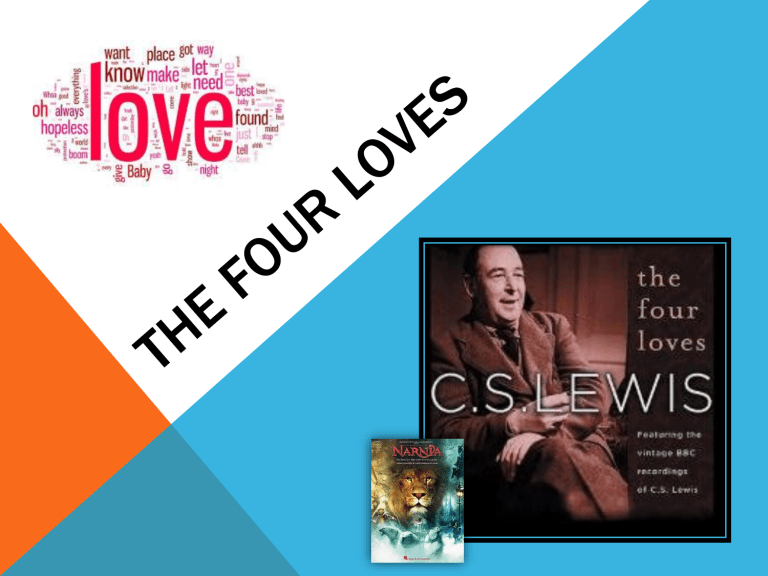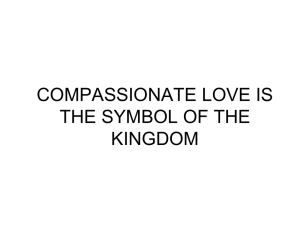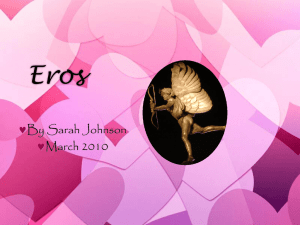
IN THE FOUR LOVES C. S. LEWIS EXPLAINS, THROUGH A CHRISTIAN LENS, FOUR FORMS OF LOVE EXPRESSED IN THE GREEK LANGUAGE •“Storge” •“Philia” •“Eros” •“Agape” (affection) (friendship) (romance) (charity) STORGE Affection is like the fondness one feels for a pet, familiarity between family members, or just the feeling of being comfortable with someone in a silence. PHILIA So, you might be companions with several people at work, but friends with a few. Friendship has to be built upon a shared interest. It has to be “about” something, otherwise it’s only companionship — though, the companionship might be strengthened with affection (familiarity.) EROS Eros can exist without Venus (Lewis’ term for sex.) It is a deep, consuming love that is focused on a single person. Unlike friendship, which welcomes many friends without jealousy, Eros is a singular focus. He distinguishes between Eros (love) and Venus (sex): Sex wants sex itself, while Eros wants the Beloved. A man prowling the streets wants sex, not a woman. He wants the woman’s body. A man searching for the woman with whom he is in Eros love wants the woman for herself. The sex he has with her is a celebration of love. AGAPE This is the sort of love that exists for strangers — for people that most would find unlovable. AGAPE is unselfish. Compassion, Empathy…. A Bible passage used at many wedding ceremonies: 1Corinthians:13 describes AGAPE. “Love is patient, love is kind. It does not envy, it does not boast, it is not proud. It does not dishonour others, it is not self-seeking, it is not easily angered, it keeps no record of wrongs. Love does not delight in evil but rejoices with the truth. It always protects, always trusts, always hopes, always perseveres.” How is ‘Agape’ different from the other forms of love? THE NATURE OF LOVE Lewis explains that the nature of love can be divided into “gift love” and “need love,” Gift love being the sort of unconditional love a mother gives her child, Need love being the sort of love a child seeks from a mother by yearning for her protection and comfort. Each is a valid form of love, and each has the potential to become toxic. NEED LOVE Love can go bad. People sometimes assume that “need love” is their due, no matter how they behave. This is apparent when a husband mistreats his wife daily and expects her to love him anyway. GIFT LOVE “Gift” love can go toxic when a mother does so much for a child that the child cannot grow, and then she becomes jealous when the child pulls away. Her desire to offer gift love (love that is a gift and comes with no strings,) has turned into a need: she feels hollow if the child does not “need” her gift love. She can’t bear to admit that he doesn’t need it, because her role is to give love, and without it, she feels she has no purpose. *Can you name a TV mom whose gift love might be toxic to her children? Let’s Talk About Love 1. What does love mean to you? Do you need it? Could you live without love? Why/Why not? 2. How does it feel to hear the words “I love you”? Do you need to hear it everyday? Why/Why not? Is it different if the words come from family, friends, a boyfriend/girlfriend, a stranger? Explain. 3. Are you too young to experience romantic love? When is one too young to say they are in love with someone else? 4. Do you love anything material? How is that different from loving a person? Is it really “love” when you love an object? Why doesn’t Lewis include it in his four types of love? Enrichment: Choose a “love song” and discuss which of Lewis’ 4 Loves does it refer to. Use lyrics from the song along with the notes from the previous slides to prove your point.




